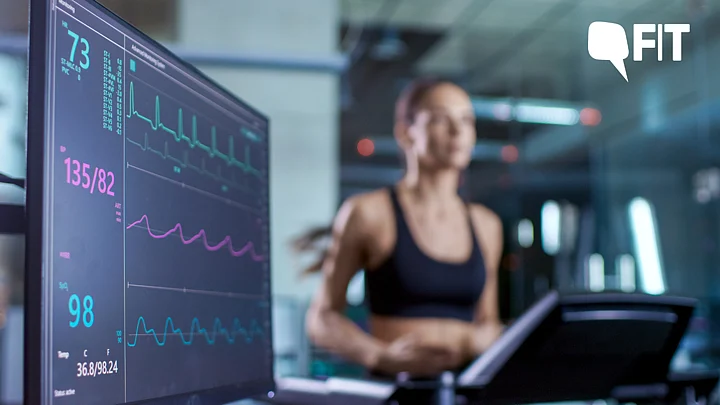India accounts for 60 percent of the world's heart disease burden – with at least 50 percent of heart attacks in men below the age of 50, according to the Indian Heart Association. 25 percent heart attacks in women too happen below the age of 40.
One common theme that has been discussed over the last couple of years is how to monitor yourself while working out – and how overexertion can impact heart health.
What are the warning signs you need to look out for? How to know when to stop? FIT asked cardiologists.
How can I monitor myself in the gym?
Keep yourself hydrated – Pre, post and during workout.
Before workout: Half to one litre of water, at least two hours before hitting the gym.
During workout: 250 ml of water, sipped slowly and periodically every 15-20 mins.
After workout: 200 - 300 ml water within 30 minutes of exercising. One can also consider drinks that can replenish lost electrolytes as well.
Keeping a gap between two sets of exercises.
Monitoring the heart rate while working out.
"Your maximum heart rate (MHR) is the highest number of times your heart should beat per minute while exercising. It can be estimated by this rule – MHR = 220 − your age. So if your age is 45, then your MHR is 175 beats/minute."Dr Kumar Rajeev, Consultant, Interventional Cardiologist Kokilaben Dhirubhai Ambani Hospital, Navi Mumbai
How can you monitor your heart rate?
"I often recommend manually checking one's pulse," says Dr Salil Shirodkar, Senior Consultant, Cardiology, Nanavati Max Super Specialty Hospital, Mumbai.
Dr Kumar elaborates, "The way to take the pulse correctly is on the inside of your wrist, on the side of the thumb."
Use the tips of your first two fingers.
Press it lightly over it. You should feel the pulsations.
Count your pulse for half a minute. Multiply this by 2 to find your beats per minute.
"Alternatively, wrist-based heart rate monitors like fitness bands or smartwatches have become widely accessible. There are also mobile applications that can measure your heart rate using your phone's camera," Dr Salil added.
“Listen to your body. If you are dehydrated, under nourished, and pushing yourself hard, it leads to muscle soreness and muscle injury fast.”Dr. Priyanka Rohatgi, PhD, Chief Clinical Dietician Apollo Hospitals, Bangalore
How do I know when to stop?
You can look out for the following signs to know when to stop:
Feeling dizzy
Heaviness in the chest
Chest discomfort/pain
Prolonged periods of raised heart rate
In case you experience any of these signs, “You should stop doing exercise immediately and take rest, if it does not settle down even after that, one should consult the doctor,” says doctor Kumar.
Exhaustion is common while working out. However, it is important to know how much you can push yourself.
"You must start slow especially if you are just beginning or resuming after a break. Try to keep yourself within the lower range of your target heart rate zone – range of heart rates that are considered safe and effective for cardiovascular exercise, typically a percentage of your MHR,"Dr Kumar Rajeev
"Exercising within this zone can optimize the cardiovascular benefits of physical activity," he added.
Here's the target heart rate zones you can keep in mind:
50-60 percent of MHR: Light intensity, suitable for beginners or those starting again.
60-70 percent of MHR: Moderate intensity.
70-80 percent of MHR: Vigorous-intensity level, suitable for regular gym goers.
80-90 percent of MHR: High-intensity, suitable for athletes or high-intensity interval training.
What intensity of exercise should you opt for incase of an underlying condition?
Experts recommend aerobic exercises such as walking, running, jogging, swimming or cycling for those with underlying conditions such as blood pressure or high blood sugar.
“Such aerobic exercises are good for our heart. They burn fat, reduce blood sugar, blood pressure, which is why we generally prefer aerobic exercises over endurance exercises,” Dr Kumar told FIT.
Moreover, “You must seek advice from your healthcare profession before starting any kind of a workout program,” said Dr Priyanka.
“If someone has diabetes, high blood pressure, or family history of heart problems, any other risk factors such as smoking, or use of tobacco should especially keep the warning signs in mind while engaging in a workout."Dr Salil Shirodkar, Senior Consultant, Cardiology, Nanavati Max Super Specialty Hospital, Mumbai
What are some precautions you can take outside of the gym?
Full body check-up: It is recommended to get a full body check-up done before you plan to join the gym.
“You should make sure to check for underlying blood pressure, cholesterol or diabetes by consulting a physician first. Getting an ECG, echo, etc. are very important,” says Dr Kumar, “for those who are regulars, it is essential to get these vitals checked at least once a year,” he added.
Eating right: “Carb loading followed by protein, nitrates and omega 3 enhances performance,” said Dr Priyanka “You can choose carbs with fibers" such as:
Granola bar
Fruit yoghurt
Porridge
Smoothies
Further experts recommend eating 2-3 hours prior to the workout, “snack composition and portion may vary based on the kind of exercise and duration for which one is exercising,” informs Dr Priyanka, “we should have a personalized diet plan based on genetics, age, gender, goals, frequency, etc.
Avoid smoking: According to experts, smoking is a risk factor for cardiovascular diseases.
Reduce alcohol: Reducing alcohol can reduce the risk of diseases.
Rest up: Experts recommend monitoring stress levels, and getting at least 7-9 hours of sleep.
What is the minimum period of activity recommended?
Experts recommend working out 30-45 mins in a day.
“World over organizations recommend at least 30 mins of exercise in a day, for at least 5 days,” Dr Kumar told FIT. However, he added, that the amount and intensity over and above will depend on the individual's capacity and health.
(At The Quint, we question everything. Play an active role in shaping our journalism by becoming a member today.)
